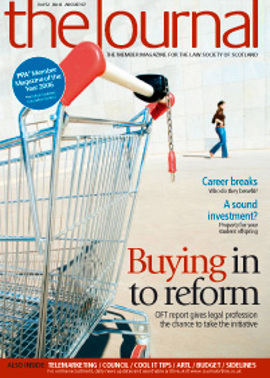SFP: a tough call

Single farm payment entitlements, introduced in January 2005 as a tradable asset arising from the mid-term review of the EU Common Agricultural Policy, remain a sound investment. Anyone considering purchasing must be registered with the Rural Directorate (formerly SEERAD) with a farm code, and must be farmers by the time of entitlement transfer, although it is quite possible to purchase more entitlements than land and then to look for additional land.
As is often the case when new assets are traded, lack of familiarity initially depresses the capital value, resulting in a higher return. In the 2006 trading period the capital value ranged from 1.3 to 3.2 times the 2005 income, with an average of 2.4. However, more trading confidence was witnessed in the 2007 trading period. The multiplier of capital value on the 2006 income ranged from 1.5 to 4.3 with an average of 3.0, representing a 25% appreciation.
Return on investment is the crucial determinant of value, and this will only be known after exchange rate movements and deductions for modulation or financial discipline (i.e. if the EU budget is exceeded). However, assuming the current exchange rate is unchanged, using estimates for modulation and financial discipline, and taking the pessimistic view that the entitlement will remain in place (only) until 2012, the return on investment at a multiplier of 3 is around 9% to 16%, before the cost of land occupation and management to fulfil cross-compliance conditions.
Set-aside
Set-aside entitlements have so far traded at a multiplier of 1.4 times the income value in 2007, compared with 1.7 in 2006. These may prove a good buy for some arable farmers where the discount on growing non-food crops, compared with food crops, is small. If, as expected, the set-aside restriction disappears in 2009, an astute arable farmer might simply have sold his standard entitlements to purchase set-aside entitlements and pocket the £100 or so per hectare difference.
2008 and beyond
It might be expected that entitlement capital values will fall in the next trading year, since the purchase of entitlement will secure one year’s less income (now to 2012). However, this was also true last year when capital values rose! While we predicted last year that greater familiarity with the asset would increase demand in 2007, raising capital values and reducing return, this will be a smaller factor in the next trading year.
It is difficult to predict the outcome in 2008 but, on balance, we expect that demand will continue to strengthen while supply will reduce sufficiently to maintain capital values at a similar multiplier on income, with consequent further fall in return. Whilst the modulation rates set on 31 May were welcomed, uncertainty still remains, which will have an impact on trading over the coming years.
The formal paper containing proposals for the “Health Check” review of the CAP to be held in 2008 is expected this summer. The paper is likely to include the ending of set-aside (a reduction in 2008 is also possible), potentially making the speculative purchase of entitlements a good buy. Capping of payments may also be included in the reform, removing some of the bigger buyers from the market. It is possible that the “Health Check” may contain proposals for change post-2012, such as movement to a regionally based system across the EU.
Nick Green, Savills, Perth t: 01738 477518
In this issue
- EAT breaks ground with TUPE insolvency ruling
- Top of the agenda
- Shaping a humane law
- Checkout the debate
- Family cases: another view
- A home of their own
- Break time
- Budget under the bonnet
- Holyrood - Scotland's voice in Europe?
- Ringing within the rules
- Cool IT for hot lawyers
- Future perfect?
- Case that makes the heart leap
- Green about the edges
- An eye on expenses
- The tail in the nail or ponytail
- Off on the right foot
- Scottish Solicitors' Discipline Tribunal
- Website reviews
- Book reviews
- Well drilled
- Good neighbour agreements - bad law?
- One small step for ARTL...
- Contaminated land: a reminder and a warning
- Contaminated land: a reminder and a warning (1)
- SFP: a tough call






